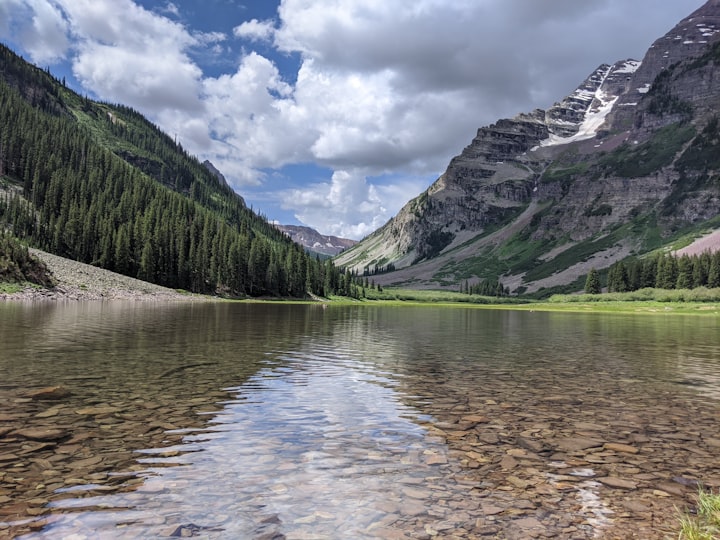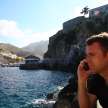You Can Find Awe Where the Words Run Out
A tale of magic mirrors and Ulysses in Hell

This is where the words run out
Between white-crowned mountains striped with shadows and furred by forests, on the slow-breathing skin of an ancient lake. The reflective water turns the mountains upside down. The sun becomes a bright bar of gold that points at everyone who looks at it.
This lake refuses to freeze. January be damned. Even as winter turns the waterfalls that feed it into glittering ribbons of ice.
These mountains have no names and no masters. They know that to name a thing is to try to control it. And all of this — sun, lake, mountains, trees — will be here after every one of us vanishes into the night. Still reflecting the hollow sky. A magic mirror that steams at its edges, reaching up toward the sun.
I didn’t know it had a name
I know about awe. I seek it like a bloodhound, chasing it into rocky clefts until it’s forced to turn at bay and bare its teeth at me.
But I didn’t know they call it an awe walk. And I didn’t know that after going on one, people take selfies less focused on themselves, capturing more of the natural world around them. They feel themselves receding, their egos melting into the trees.
The artificial separation between the world and us dissolves. Mountains don’t rise, and the lake doesn’t sing. They just are. And so are we.
I didn't know what I was starting
The first time I ever went kayaking was on the Mediterranean. Renting a boat from a friendly young Spaniard, me and my wife set out around the headland to a natural arch over the dazzling water. The sun shone on the Costa Brava, and an Iberian fortress from the sixth century BC looked sternly down on us as we paddled and splashed.
Since then, it’s become a big part of my life. A reliable pathway to awe. A way to escape the chatter of the everyday and absorb the holy silence of the real world. Not the TV. Not the Internet. Not the grocery store and the rent checks and all the noxious smoke we pretend is real.
The mountains and the forests are real. The rest is illusion. Maya, the Buddhists call it. We’ll come back to them.
Half a world away from Spain, out on the gentle Canadian water, I stopped paddling. The only sound was the sibilant song of the lake kissing the stones. A strange thing happened. I, a person who has made words into my living and my life, ran out. For a timeless space, rocking gently on the water, I stopped thinking in words. I stopped thinking at all.
How do you talk about the ineffable? The peace that passes understanding. The bright immensity of the world that unfolds around us like a lotus blossom. Satori, the Buddhists call it, when they talk of the strange moments of awakening that come over us. When we fall, like Leonard Cohen said, into the masterpiece.
All mirrors are magical
They show us the world, but flipped around, transformed by the act of reflection. It’s why you never quite look right in photos. Our asymmetrical faces are different in real life from what the mirror shows us.
The Aztec god Tezcatlipoca, master of the night sky and Lord of Change, has a name that translates to the Smoking Mirror. Because change is life, but change can be dangerous.
And a mirror can be a dangerous thing. Including this one. Especially this one. Every few years, these waters claim a few more lives.
Mirrors lie. As you reach out for them, something reaches back. But it isn’t you. It’s change. It’s the night sky. It’s a monster strong enough to shatter the illusion.
The path to awe
You don’t need my glorious surroundings, lakes and mountains and endless ancient forests. Awe is readily available to anyone looking for it, the same sun touching each one of us alone.
A winter swan stepping carefully on the feet of its inverted reflection on a frozen pond. The wild snap and spit of a fireplace turning wood into plasma, in reverse of the sun’s gift that made the trees grow in the first place. The bright net of stars that followed you home last night, each one big enough to swallow everything you ever loved.
In ancient Europe, the Pillars of Hercules were the end of the world.
The two great rocks that frame the edge of the Mediterranean world and the start of the wild Atlantic. Non plus ultra. Beyond here lies nothing. Five million years ago, we know now, a rock wall collapsed and transformed what was a vanishing inland sea into an inlet of the open ocean.
Dante didn’t know that. Nor did Ulysses, whose spirit Dante meets in Canto 26 of the Inferno. The Greek adventurer tells the Italian poet how he and his men, ‘already old and slow,’ set off into the unknown for one last adventure.
“Consider well the seed that gave you birth: you were not made to live your lives as brutes, but to be followers of worth and knowledge.”
We are made to seek the truth. To peer into the depths of oceans and lakes and mirrors and uncover what hides inside. The sea swallowed Ulysses and his men, their Mediterranean vessel no match for the Western ocean. But as the water closed above them, they must’ve felt the blinding clarity of satori one more time. They must have felt an overflowing of awe.
I didn’t sail the sea
I flew over it. From Gaeta, where Ulysses and I both used to live, to the western edge of North America. To this lake, free of Greek adventurers and Italian poets. To this moment of ego-annihilating awe that was waiting silently for me.
In my solitary craft, I float above my own reflection. Joined together at the rippling hull, with only a faint trail of bubbles behind me to mar the magic mirror.
They reflect us upside down and back to front, the left hand becoming the right and our scars shifting until we no longer recognize ourselves. Until we no longer see ourselves. And as our ego dissolves, it creates space for the real world to rush in with all its glory and majesty.
No ice. No masters. No names.
This is where the words run out.
About the Creator
Ryan Frawley
Towers, Temples, Palaces: Essays From Europe out now!
Novelist, entomologist and cat owner. Ryan Frawley is the author of many articles and stories and one novel, Scar, available from online bookstores everywhere.






Comments
There are no comments for this story
Be the first to respond and start the conversation.